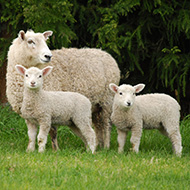
Experts are working with livestock producers to use faecal egg counts.
Livestock producers are being urged to not overreact to rumen fluke figures in faecal egg count (FEC) sample results.
According to experts in the Sustainable Control of Parasites in Sheep (SCOPS) and Control of Cattle Parasites Sustainably (COWS) groups, the inclusion of the figures in the results 'isn't necessarily a cause for concern'.
SCOPS and COWS have been working tirelessly to support livestock producers in their use of FECs to monitor liver fluke in sheep and cattle. The experts say the parasite has become increasingly unpredictable, and this has also brought rumen fluke into the spotlight.
Diana Williams of the University of Liverpool, who sits on the COWS Steering Group, said: “Many farmers and their advisers are, quite rightly, looking at FEC sample results at the current time. This is an important element within active liver fluke monitoring. But within the SCOPS and COWS industry groups, we are keen to ensure this does not lead to unnecessary treatment of rumen fluke in sheep and cattle.
“Increasingly, laboratories will record the incidental presence of rumen fluke eggs in faecal samples, but this does not indicate a need to treat.”
She added that a positive egg count only suggests the presence of adult rumen fluke.
“On the very rare occasions that disease is caused by rumen fluke, it is due to large numbers of immature rumen fluke in the duodenum (duodenitis),” she continued. “There are no specific diagnostic tests for immature rumen fluke, and they would be negative on faecal egg count.”
To support farmers, SCOPS and COWS have published the following advice for livestock farmers:
- The detection of rumen fluke eggs only indicates the presence of adults in the rumen. In the majority of cases, it does not indicate any production loss or need to take action.
- Liver fluke remains the more important of the two fluke parasites. Co-infections of liver fluke and rumen fluke are common, but any treatment should focus on the presence of liver fluke.
- Disease due to rumen fluke is not typically caused by adults in the rumen. It is due to a large build-up of immature rumen fluke in the duodenum and is the result of a very high challenge on pasture, leading to large numbers of immature parasites in the intestine.
- If you are concerned about rumen fluke, discuss results with your vet. There are no licensed treatments for rumen fluke and the only active that can kill them (oxyclozanide) has a low safety margin and must be used carefully. Cases of toxicity, resulting in blindness, have been reported.
- Oxyclozanide can only be prescribed by a veterinary surgeon for use against rumen fluke and should only be used where there is conclusive evidence that an infestation of rumen fluke is likely to be causing a health / welfare issue.
- It is the opinion of SCOPS and COWS experts that anecdotal reports of production and/or health benefits in response to treatment of rumen fluke are unlikely to be due to removal of adult rumen fluke and much more likely to be as the result of removing a co-infection of liver fluke that may not have been reported.



 The RCVS has announced a new version of its 1CPD mobile app, with enhanced features for veterinary surgeons and veterinary nurses to record their continuing professional development.
The RCVS has announced a new version of its 1CPD mobile app, with enhanced features for veterinary surgeons and veterinary nurses to record their continuing professional development.